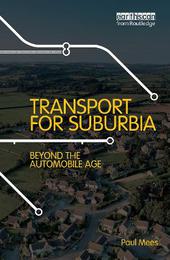
|
Transport for Suburbia: Beyond the Automobile Age
Hardback
Main Details
| Title |
Transport for Suburbia: Beyond the Automobile Age
|
| Authors and Contributors |
By (author) Paul Mees
|
| Physical Properties |
| Format:Hardback | | Pages:240 | | Dimensions(mm): Height 234,Width 156 |
|
| Category/Genre | Transport technology and trades |
|---|
| ISBN/Barcode |
9781844077403
|
| Classifications | Dewey:388.4091733 |
|---|
| Audience | | Postgraduate, Research & Scholarly | | Professional & Vocational | |
|---|
| Illustrations |
Maps, diagrams, tables, index
|
|
Publishing Details |
| Publisher |
Taylor & Francis Ltd
|
| Imprint |
Earthscan Ltd
|
| Publication Date |
16 December 2009 |
| Publication Country |
United Kingdom
|
Description
The need for effective public transport is greater than ever in the 21st century. With countries like China and India moving towards mass-automobility, we face the prospects of an environmental and urban health disaster unless alternatives are found. It is time to move beyond the automobile age. But while public transport has worked well in the dense cores of some big cities, the problem is that most residents of developed countries now live in dispersed suburbs and smaller cities and towns. These places usually have little or no public transport, and most transport commentators have given up on the task of changing this: it all seems too hard. This book argues that the secret of 'European-style' public transport lies in a generalizable model of network planning that has worked in places as diverse as rural Switzerland, the Brazilian city of Curitiba and the Canadian cities of Toronto and Vancouver. It shows how this model can be adapted to suburban, exurban and even rural areas to provide a genuine alternative to the car, and outlines the governance, funding and service planning policies that underpin the success of the world's best public transport systems.
Author Biography
Paul Mees is Senior Lecturer in transport planning at the Royal Melbourne Institute of Technology. He is the author of A Very Public Solution: Transport in the Dispersed City (Melbourne University Press, 2000).
Reviews'The essential primer for all transport planners.' Christian Wolmar, Transport Times '...tells a compelling story of what is wrong with public transit systems around the world and how transit can work well in low-density, auto-oriented places.' Kenneth Joh, The Journal of the American Planning Association 'A book which ought to become as celebrated and influential as Jane Jacobsi? work on cities or the famous San Francisco study by Appleyard ... The essential primer for all transport planners.' Christian Wolmar, Transport Times '[A] fascinating, well-written, well-researched book, easily understood by the layman.' Railwatch 'This is a powerful book that combines detailed practical observation with a rigorous intellectual assessment and shows exactly what is wrong with public transport systems around the world and what is needed to put them right...It is a masterly overview and one that sets all policy makers, planners, politicians, urbanists and transport professionals a clearly defined task. The task is to deliver high quality public transport in a zero tolerance environment for excuses. After this book there can be no excuses.' Professor John Whitelegg, Stockholm Environment Institute, University of York, UK 'Therei? s no need for low-density despair.' Mobility Magazine 'Mees has written a book that is a bus transit buff's dream' D. Brand, Choice, July 2010. 'Now thanks to a book which ought to become as celebrated and influential as Jane Jacobs' work on cities or the famout San Francisco study by Appleyard, I have the anser. And to paraphrase, Tony Blair, its policy, policy, policy and not density.' Christian Wolmar, e-newsletter. 'Should be the essential primer for all transport planners' Christian Wolmar, e-newsletter. 'Deserves to be widely read - particularly by Government ministers and officials with responsibility for transport planning' Manchester Climate Fortnightly, 2010. 'In this thought-provoking book, Paul Mees provides a very personal and frank critique of many aspects of public transport planning, finance, and operations in Australia, New Zealand, the US, and the UK.' John Pucher, Built Environment '...recommended reading.' Philip Laird, Australian Options '..an intriguing offer from Paul Mees... this is an important argument and a bold claim... [it] should be widely read - and the lessons implemented.' Journal of Transport Geography
|